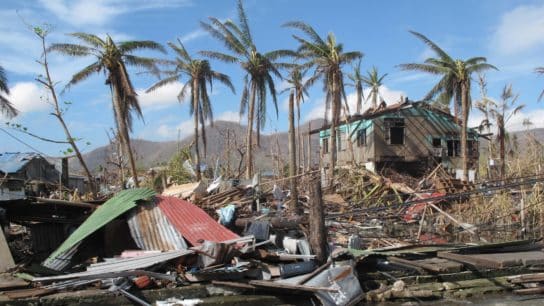This weekly round-up brings you key climate news from the past seven days, including a scientific update on climate tipping points and an important shift in China’s energy landscape and priorities.
—
1. Global Warming of 1.6C Now Best Case Scenario, New Research Shows
The world will soon witness an overshoot of the 1.5C global warming target, according to a new study that argues that constraints in implementing climate policies in some countries make the Paris goal no longer feasible.
“Limiting peak temperature to below 1.5C is not possible with even moderate likelihood anymore,” said lead author of the study Christoph Bertram, who is associate research professor at the University of Maryland and guest researcher at the Potsdam Institute for Climate Impact Research (PIK).
Bertram and his colleagues examined dozens of potential scenarios that take into account technological advancements as well as the feasibility of enforcing climate policies in different regions of the world. They found that green tech’s significant contribution in speeding up the energy transition worldwide gives the world a 50% chance of limiting global warming below 1.6C – now the best case scenario.
However, constraints that prevent some governments from implementing climate policies such as a carbon tax reduce the likelihood of staying within this limit to 5-45%. Constraints range from a lack of adequate infrastructure to ineffective bureaucratic systems and are particularly an issue in developing countries, which lack financial resources.
Read more here.
2. Heat-Related Mortality in Europe Could Triple by 2100 Under Current 3C Warming Scenario, New Study Suggests
Europe could see three times as many heat-related deaths by the end of the century unless ambitious adaptation measures are implemented continent-wide, according to a new study that looked at the risk patterns of climate change in some European regions.
Accounting for current climate policies in place, the world is on track to 3C of warming, the study said. Under this scenario, Europe could see an estimated 128,809 deaths by 2100 compared to about 44,000 in the period of 1991-2020. Under the Paris Agreement 1.5C and 2C warming targets, deaths from extreme heat would rise to approximately 58,000 and 76,000, respectively.
Among the 30 countries modelled, Italy is the country where most heat-related deaths occurred in the period of 1991-2020 – a staggering 10,433. Under a 3C scenario, the number will more than double to reach about 28,285 in 2100. Germany ranked second with 6,909 deaths between 1991-2020 and an estimated 16,913 by century’s end, closely followed by Spain with 4,414 and 20,194 fatalities, respectively.
Read more here.
3. Current Decade ‘Critical’ to Avoid Permanent Breach of Climate Tipping Points, Study Warns
In a study on climate tipping points published in August in Nature Communications, researchers said that every emissions reduction policy adopted this century will determine how climate patterns will change in the centuries to come.
Reaching and sustaining net-zero greenhouse gas emissions by 2100, researchers said, is “paramount” to minimize the risk of irreversibly affecting climate patterns.
Tipping points refer to multiple stable states of different planet’s life-support systems that all societies depend on and that, if pushed too far, could result in unstoppable, permanent, and irreversible changes in their state. For instance, continuous external pressure on a system like the Amazon rainforest, the world’s largest and richest biological reservoir and one of the most important natural carbon storage systems, can turn the forest into a savannah and a source of carbon dioxide.
Read more here.
4. China Slashes Coal Permits Amid Renewables Boom But Environmentalists Warn ‘Only Time Can Tell’ if Fossil Fuel Era Is Over
The world’s largest coal producer, which last year generated a record output of coal, cut back on new coal power permits by 83% in the first half of 2024 compared to the same period a year ago, permitting only 12 projects totalling 9 gigawatts. It comes after the country approved 106 gigawatt’s worth of coal-fired power capacity in 2022, the highest amount since 2015, and another 70.2 gigawatt’s worth in 2023 – 95% of the world’s new coal power construction activity that year.
The drop in new coal project permits coincides with an unprecedented deployment of renewable energy that remains largely unmatched anywhere in the world. Using figures released by the Chinese government last week, CREA reported that the country’s solar and wind power generation has increased by 171 terawatt so far this year. This matches the amount the UK produced from all energy sources in the same period in 2023.
Still, the new data, presented by the Centre for Research on Energy and Clean Air (CREA) in a press release on Thursday, also indicates “robust” coal power construction activity so far this year.
Read more here.
5. Judge Orders Three-Month Suspension of Deforestation in Argentina’s Chaco Province
An Argentinian federal judge on Monday ordered the suspension of deforestation in the northern parts of the Chaco province amid a corruption investigation over illegal land clearance.
The suspension was requested by Patricio Sabadini, federal prosecutor of Resistencia, the capital of Argentina’s Chaco province. It will last for at least three months “or until the situation is re-evaluated” and affect both authorized clearings and the ones that have not yet been carried out, the public prosecutor announced in a statement published on its website on Monday. New clearing permits are also suspended.
The request came amid an investigation involving seven defendants, including business people and local officials and legislators. They stand accused of facilitating and profiting from the “indiscriminate felling of trees” in Chaco and provoking “irreversible damage to the environment and future generations.”
Read more here.














